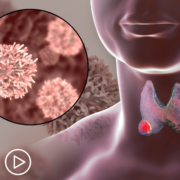Emerging Advancements in Thyroid Cancer Treatment
Emerging Advancements in Thyroid Cancer Treatment from Patient Empowerment Network on Vimeo.
What are the latest thyroid cancer treatment advancements? Expert Dr. Megan Haymart from the University of Michigan shares an overview of treatment updates along with proactive advice about actionable mutations for personalized thyroid cancer treatment.
[ACT]IVATION TIP
“…if you have high-risk advanced disease that’s progressing, I think it’s very important to ask your physician if they’ve done tumor sequencing to see if there’s any actionable mutations, because then you could have more targeted treatment.”
See More from [ACT]IVATED Thyroid Cancer
Related Resources:

|

Advancing Thyroid Cancer Care: Tailored Treatment and Patient Involvement |

Personalized Treatment Approaches in Advanced Thyroid Cancer Management |
Transcript:
Lisa Hatfield:
Dr. Haymart, new advancements in thyroid cancer treatment are emerging. What are some promising therapies on the horizon, and how might they benefit patients?
Dr. Megan Haymart:
So there’s a couple of exciting new treatment options that are available. So one is for high-risk patients who have advanced disease. So this will be a minority of all the patients I see. So it’s probably five to 10 percent that have high-risk advanced disease that’s progressing at most, probably closer to 5 percent. For these individuals, we now have targeted treatments where we can do molecular testing of the tumor, and try to identify the mutations and then give treatments that are targeted towards those mutations.
Not everybody needs this. So many of my patients do great with sort of the standard therapy of surgery, maybe surgery and radioactive iodine if they have papillary or follicular thyroid cancer, they had some lymph nodes involved, but there are some where they have distant metastasis, it’s aggressive, it appears to be growing. And so we do have new treatment options and there’s more and more trials and treatment options becoming available every day.
The other exciting thing that’s available now is there’s new treatment options for lymph node metastasis. So most of the time for lymph node metastasis, you’re going to have another surgery. You always want to see the surgeon first, but sometimes there’s patients who’ve had multiple neck surgeries. The surgeon can’t go back in, or it feels like it’s too high risk to go back in.
We now sometimes use percutaneous ethanol ablation. We’re starting to use radio frequency ablation to treat these isolated lymph node mets when surgery is no longer an option. And so I think that it’s exciting because we have opportunities for patients that we didn’t have in the past. And I think it’s just going to continue to improve in regards to use of these new therapies.
Lisa Hatfield:
Okay, thank you. And do you have any activation tips for that question?
Dr. Megan Haymart:
My activation tip for this question is specific to individuals with high-risk advanced disease that’s progressing, And so if you have high-risk advanced disease that’s progressing, I think it’s very important to ask your physician if they’ve done tumor sequencing to see if there’s any actionable mutations, because then you could have more targeted treatment. Some of these targeted treatments work better, some of them have lower side effects, and so it’s really an era of more tailored care, and this is an important question to ask.
Lisa Hatfield:
Dr. Haymart, how do genetic mutations and molecular markers influence treatment decisions in thyroid cancer and what personalized medicine approaches are being developed?
Dr. Megan Haymart:
So for patients with advanced disease, and it’s progressing, so they have distant metastasis, it’s growing. We can now test for mutations in the tumor to see if there’s any actionable mutations that patients can get targeted treatment. And so that wasn’t available in the past and it is now. And I think it’s really changed the way we take care of our advanced thyroid cancer patients. And my activation tip for this question is, if you have advanced progressing thyroid cancer, ask your doctor if your tumor has had sequencing to see if there’s an actionable mutation because there may be a targeted treatment that you’re a candidate for.






